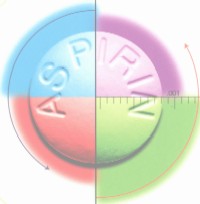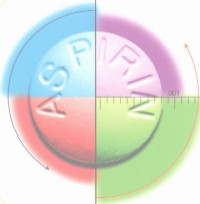"The UC Davis Health System is discovering and sharing knowledge to advance health"
Take or Not to Take
An Aspirin a Day
Who should consider taking a daily aspirin? ...Aspirin, once mostly used on an occasional basis for fever, aches and pains, is now, for many, taken daily like a vitamin pill. If you’re taking an aspirin daily, is that a wise practice? Alternatively, if you’re not, should you be? How aspirin works . ....Reducing prostaglandins can have harmful effects as well. It can make the stomach lining more vulnerable to ulcer formation and bleeding. And for some people who are prone to asthma, it can trigger an attack. Who should take aspirin?
....Aspirin’s ability to reduce the risk of a second heart attack or stroke has been known for quite a while, and doctors have long advised people who have previously had a heart attack, an ischemic stroke (one caused by a clot) or TIAs (so-called “mini-strokes”) to take a daily aspirin. Patients with unstable angina, who are at very high risk for a heart attack, are also treated with aspirin in the hospital. ....There is also enough evidence of aspirin’s benefits in reducing heart attack and stroke risk that doctors are increasingly recommending a daily aspirin for many healthy people. This includes all men over age 50 and all women over age 60, especially if they have even one risk factor for heart disease. Risk factors include a personal or family history of heart disease, having hypertension, being overweight, not exercising, smoking, having high cholesterol or being diabetic. Who should NOT have daily aspirin? ....Children under age 19 are never given aspirin because of the concern about Reye's Syndrome, a potentially deadly disease. Reye's syndrome is a disorder principally affecting the liver and brain, marked by rapid development of life-threatening neurological symptoms. ....For some individuals, the risks of aspirin therapy itself are greater than the potential benefits. A significant percentage of people develop stomach irritation from aspirin. For many it is mild, but for others who develop ulcers or internal bleeding, the health consequences can be major. Gastric problems can often be avoided by taking the lowest recommended daily dosage or using enteric, or coated aspirin. ....People who suffer from severe liver or kidney disease should also avoid aspirin, as should those who consume three or more alcoholic drinks each day. People who are allergic to aspirin, as evidenced by facial swelling or an asthma attack, also must not take aspirin. ....High blood pressure, while posing a significant risk for heart attack and stroke, must be brought under control before initiating daily aspirin. High blood pressure greatly increases the risk for hemorrhagic strokes, the type caused by rupture of a small blood vessel and resultant blood leakage into the brain. The anticoagulant properties of aspirin can exacerbate this kind of stroke. ....People who have been diagnosed with atrial fibrillation need anticoagulant medication, but aspirin is typically not adequate for their needs. Most are advised to take warfarin (Coumadin), a stronger medication that is generally not combined with aspirin. For minor aches and pains, patients on warfarin should take acetaminophen or another non-aspirin analgesic. ...Daily aspirin therapy can be a lifesaver for many, but because of the risks, do not ....Even if you decide not to take a daily aspirin, keep a bottle of chewable baby aspirin in your car and in your medicine cabinet. It’s important to have one on hand in case of a heart attack. Take two 81-mg tablets as soon as any heart attack symptom, such as chest pain or tightness, arises. Then go to a hospital emergency room or call 911 at once. ....Aspirin, however, should not be taken at the time of a stroke. Symptoms may include sudden severe headache, dizziness, blurred vision, confusion, weakness or trouble speaking or understanding speech. Before a medical evaluation, it is impossible to determine if a stroke is hemorrhagic, which may worsen with aspirin.
|
|||
Related links • Aspirin / In case of overdose / Medications Containing Aspirine (Medline) • Diabetes and Aspirin (American Heart Association) • 'An Aspirin a Day' (U.S. Food and Drug Administration FDA Consumer magazine) • An aspirin a day: Will it keep a heart attack away? Learn more before starting any new therapy (American Heart Association) • Daily aspirin therapy: Understand the benefits and risks (Mayo Clinic) vv |
|||
Salud+HealthInfo is for information and educational purposes only. You should not rely on this information as a substitute for personal medical attention, diagnosis or hands-on treatment. If you are concerned abut your health or that of a child, please consult your family's physician or health provider immediately and do not try and diagnose yourself. Copyright © 2001-2012 Info Option Network About Us | Privacy Policy | Disclaimer | Contact Us | TEL-619-427-4111 |
|||
Bienvenido a la primer revista dedicada al cuidado de la salud
 info
info
The first, the best & the only English & Spanish Magazine in San Diego, California
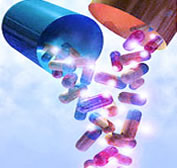
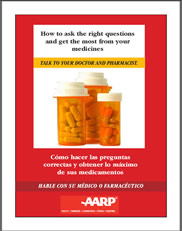

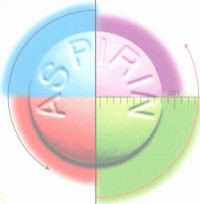 ...
...